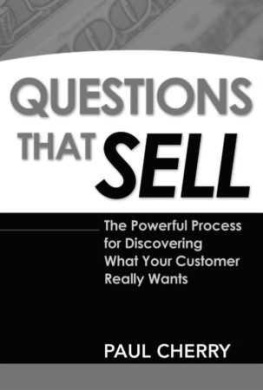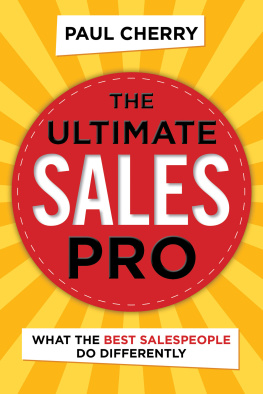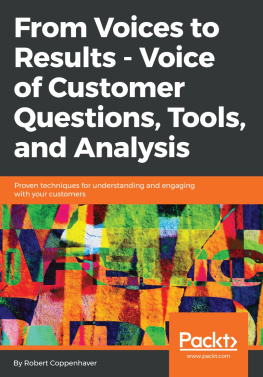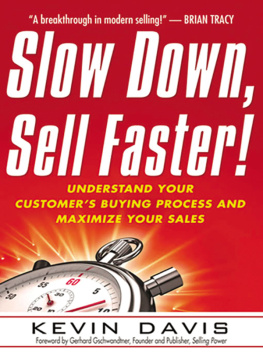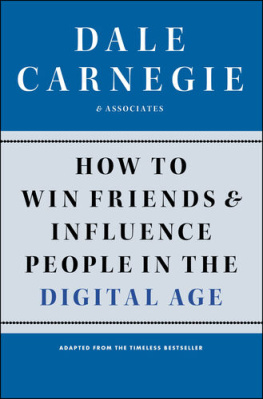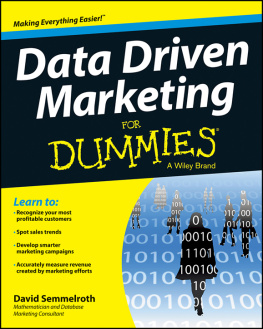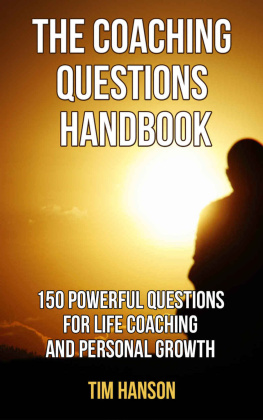


The Powerful Process for Discovering
What Your Customer Really Wants
Paul Cherry







Contents
vii 1
CHAPTER 1 9
CHAPTER 2 17
CHAPTER 3 35
CHAPTER 4 55
CHAPTER 5 69
CHAPTER 6 79
CHAPTER 7 97
CHAPTER 8 107
CHAPTER 9 121
CHAPTER 10 135
173 181
List of Figures
Introduction
DOES THIS SOUND FAMILIAR?
The world is running at a faster pace than ever before and we as salespeople must constantly adapt to new situations. In the present climate customers do not want to spend a lot of time building relationships with salespeople. They want quick and easy solutions at the cheapest price. Technological advances have forever changed our world; now that customers can do business with companies all over the globe they do not need expert salespeople. Instead, customers can get instant access to information on the Internet or from the hordes of salespeople that call them each day. Instead of trying to be the customer's friend, you as a salesperson need to cut to the chase and offer the best deal or you will lose out every time!
These statements are misguided. The idea that our world is fundamentally different from the world of 1980 or 1950, or even 1900, is ludicrous. Dale Carnegie wrote his book How to Win Friends and Influence People in 1938 and it is still a staple in bookstores today! We might have different technologies now than we did twenty years ago, but the people we do business with have not changed. If you do not remember anything else you read in this book, remember that! People are still people no matter what year it is.
If we look back in history we will see that every generation has believed that theirs was the one that revolutionized the world. When cars were invented, everyone assumed that life and the relationships that make it up would be changed forever. (The same is true for electricity, television, airplanes, and computers.) People believed that automobiles would cause personal relationships to disintegrate as people were free to travel hundreds of miles away from family and friends. In the end, though, the importance of real relationships has not diminished, and I contend that it never will.
How can I make such a bold statement? I have learned through years of sales and consulting that there are two types of relationships: superficial and substantive. Superficial relationships are characterized by chitchat about the weather, golf, and other neutral topics; these relationships are built on casual exchanges and they lack any real depth. An example of a superficial relationship is when you meet a client who went to the same college as you did. There are a few minutes of shared memories and bonding over this coincidence, but this does not change the way you two do business. The second type of relationship is the substantive relationship, which is characterized by mutual benefit.
I ask salespeople in my seminars to describe the word relationship. The usual responses include descriptors such as trust, rapport, honesty, and understanding. Although these are admirable qualities to pursue with prospective clients, they are not what most clients are looking for. When customers are asked to define relationship in a business situation, they discuss things such as how a salesperson can bring value to their companies. The Gallup Organization conducted a major study of 250,000 sales professionals, the results of which were published in the book Discover Your Sales Strengths: How the World's Greatest Salespeople Develop Winning Careers by Benson Smith and Tony Rutigliano. They found that there was little if any correlation between having good people skills and achieving success in selling. I'm not claiming people skills are unimportant in selling-they are. But developing meaningful relationships is more than being friendly. A true business relationship requires you to ascertain a customer's visions, desires, fears, and motivations, and that means asking good questions-questions that engage your customers-and to channel that energy into action.
In this kind of relationship, you as the salesperson are not solely concerned about making money or closing the deal; rather, you want to help the customer in three key ways:
1. Minimizing the customer's risk. This is done by eliminating a customer's fears (about spending too much money or buying a product that will malfunction) and making certain that the customer can hold his head up high after purchasing your product for his company. If your customer can sleep well at night because of his dealings with you, he will definitely want to do business with you in the future.2. Enhancing the customer's competitive standing. Customers, like all businesspeople, want ultimately to move ahead. If your product can make them look good in front of their colleagues and serve as a step up the corporate ladder, you will definitely earn a place at the bargaining table.3. Achieving the customer's goals. A salesperson who can provide a solution that will increase profit or decrease cost is irreplaceable. If you can help a customer achieve her dream of taking her company to the next level, you will not only be a salesperson; you will be a true partner.
What do all of the above have in common? In every instance you, as the salesperson, are earning your place and achieving results in order to establish a relationship. Substantive relationships do not appear out of the blue; they are cultivated by hardworking salespeople who understand that the key to achieving success is establishing real value in the eyes of the customer.
For too many years so-called sales experts have been preaching the values of relationships without defining them. Most have argued that salespeople need only to "build rapport, honesty, and trust" in order to further their business ends. These are the characteristics of a friendship, though, and they do not necessarily build a successful sales relationship. Customers do not want to "make friends"; they want to see results and substantive relationships provide those.
Do These Questions Really Work?
As a consultant, I deal mostly with salespeople who sell products and services in the business-to-business market. This means two things: The lessons I am teaching you have been tested and used by thousands of top-earning salespeople in the country. These techniques work, but they take time and effort to learn. If you are looking to create and sustain lasting business relationships with your customers in a way that sets you apart from everyone else in your industry, then you will no doubt benefit greatly from the advice I have to offer.
Next page
